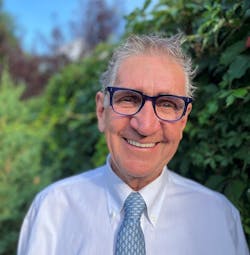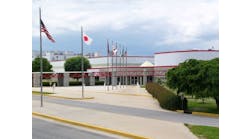New TIA President to Focus on Recruitment, Training, EVs and More
Jim Pangle, who starts his term as Tire Industry Association (TIA) president this month, understands independent tire dealers.
He spent his first 27 years in the tire industry as the owner of a Fountain Tire Ltd. store in Edmonton, Alberta. He also has owned a commercial tire center and retread plant.
Pangle later moved into Fountain Tire’s corporate office, where he has held a variety of executive roles and now works for the Edmonton-based company as a business development specialist.
He says this experience puts him in a unique position to serve TIA’s members, particularly fellow tire dealers.
“Being a store owner and manager prepared me to understand the challenges of our industry - both at the store level and organizational level,” he notes.
In this interview, Pangle discusses issues that will take priority during his term as TIA president and what he hopes to accomplish. (He was joined by Dick Gust, TIA’s CEO, who also offered his thoughts.)
MTD: What are the most pressing issues facing TIA’s dealer members?
Pangle: I think the three biggest issues are people, training and electric vehicles (EVs.) From the people side of it, there’s a major shortage across North America. It’s not unique to the United States and it’s not unique to Canada. It’s across the entire industry. I see it every day as I talk to store owners.
That leads to training, which has always been a priority of TIA’s and will continue to be going forward. At the end of the day, we want the same thing for our people - to come home safely. Without training, you don’t have the people. And without people, you don’t need training.
And we’re seeing how fast EVs are entering the market. I think this is going to hit us like a tsunami. There’s a lot to learn. One related issue is Right to Repair. Our members (need to have) the knowledge and tools to service these vehicles.
Gust: We need to start pulling more people who are interested in becoming a technician into our industry and I think EVs are going to be a way to get more people interested. Jim and I have been talking about this for a long time.
Pangle: We want to develop best practices for TIA members to safely service EVs - the proper lift points, the proper equipment, the proper training. It’s going to be another training avenue that I believe we’ll head down. A lot of people don’t have any idea where the batteries are in these vehicles and the danger in servicing them.
MTD: TIA continues to address legislative issues that impact dealers. Can you bring us up to speed on some of the things the association has been working on?
Gust: One thing we need to remember is that we have a great (legislative affairs) team that has been around for a long time. Jim will bring a unique perspective because we are so close to these issues here in the States, but there are (legislative) concerns from dealers in Canada.
The infrastructure bill in our country doesn’t impact Canadian tire dealers, but Right to Repair could at some point. We were pleased that no new taxes were directed at our industry via the infrastructure bill. We made sure small businesses weren’t going to be impacted by that. We think that was a win for us.
Another win is there will be money in the infrastructure bull for us to promote things in the tire recycling arena, (like) modified asphalt - things that are beneficial to our industry. We’re actively pushing for some of those.
In the recent Inflation Reduction Act, there’s additional funding for IRS people and the concern we have is how that’s going to be directed. We’re spending a lot of our time and resources talking to people in Washington D.C. to ensure that small businesses won’t be targeted.
We’ve worked to repeal the estate tax and we’ve had some successes.
Jim and I have talked about how we’ve always addressed political issues in the U.S. But maybe there are some ways to work together on Canadian issues?
Pangle: Lots of what happens in the U.S. spins off into Canada very shortly. We want to be prepared.
MTD: How does TIA balance the interest of its tire dealer members with non-dealer members?
Pangle: TIA works on issues that are important to the entire industry. I see it as a pay-it-forward. If TIA is seen as working for the whole industry, all of our members will see the benefits and others may want to become members of the association.
MTD: What’s the biggest thing you want to accomplish during your term?
Pangle: The biggest issue facing our industry is lack of (employees). That’s going to be the biggest thing. I would like to see some kind of discussion around where we need to go to attract these people.
I’d like to see something down the road where tire technician becomes a certified trade. We’ve had some discussions.
Gust: We have to update some of our training programs. We’re updating our Certified Automotive Tire Service (ATS) program and hope to have that done in late-2023. As we create more best practices for EVs, I can see that moving into the ATS program in 2023 or 2024.
MTD: Why is it important for tire dealers to get involved with TIA?
Pangle: The industry is evolving at a faster pace than ever, especially advancements in vehicle technology. I can’t stress enough the importance of TIA’s training. TIA also provides an opportunity for those in the tire industry to connect with other organizations. Non-members have no idea what they’re missing by not being part of TIA.




